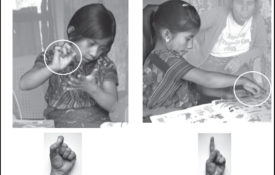-

Breakthroughs in Brussels: Researchers Share New Integrative Science at ICPS 2023
“Human behavior is at the heart of so many global challenges involving behavior change,” said Susan Michie at ICPS 2023. And at the heart of “preventing and getting out of them.”
-

Diversity Training: One Size Does Not Fit All
Diversity trainings as currently practiced are unlikely to change police behavior, suggests an analysis of a day-long training session designed to increase U.S. police officers’ knowledge of bias and use of evidence-based strategies to mitigate bias.
-

The Self-Taught Vocabulary of Homesigning Deaf Children Supports Universal Constraints on Language
Researchers compared how young homesigners—deaf children without access to an established sign language—and English-, Spanish-, and Chinese-speaking adults describe the use of tools such as paintbrushes and knives.
-

Psychological Stress Impedes Performance, Even for Olympic Athletes
Research done in Psychological Science provides support for something sports fans have long suspected: When athletes feel the pressure, their performance suffers.
-

More Than 50 Psychological Scientists Named APS Fellows
The newest class of APS Fellows are recognized for research that spans many subdisciplines in exploring solutions to complex challenges and answering questions central to human (and animal, in the case of at least one new Fellow) psychology.
-

Six Early-Career Researchers Honored With 2023 APS Janet Taylor Spence Award
The six awardees are honored for groundbreaking research in areas including bias and discrimination, motivation, learning, and change.

